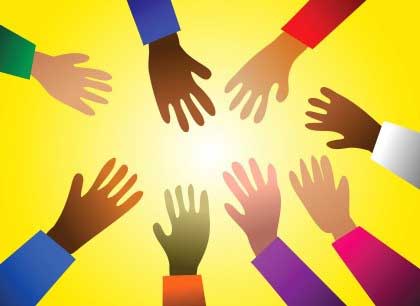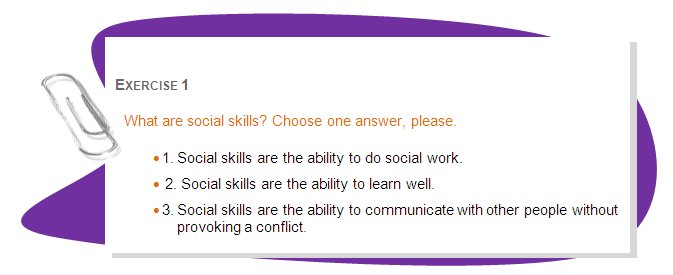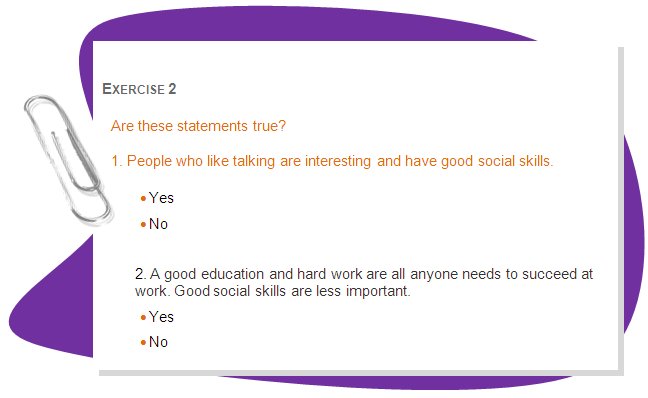Key Competencies Kit
for Facing Lifelong Learning


 |
This Project has been funded with support from the European Commission. This communication reflects the views only of the author, and the Commission can not be held responsible for any use which may be made of the information contained therein. |
 |

"Social skills are all the things that we should say and do when we interact with people."- Michele Novatni
Social and civic skills are the most important abilities a person can have. People are social beings and a lack of good social skills can lead to a lonely, unhappy life, full of anxiety and depression.
Great social skills help you meet interesting people, create good, supportive family, get that job you want, progress further in your career and relationships.
Happily, like any skill, social and civil skills can be successfully learned…
Very often we have a incorrect beliefs about our social competence. Here are some common examples of such ideas:
|
How do we develop our social competence?
The way we behave depends very much on other people that surround us and on the way we communicate with them.
Social competence is more than just set of separate skills. It is the ability to use various skills and psychosocial resources in a particular situation.
For example, the ability to communicate effectively is a competence that may depend on your knowledge of language, ability to understand information and express your thoughts. Sometimes for communication you may need practical computer skills: talk over Skype, write and send messages.
No less important is your attitudes towards those with whom you are communicating.
Throughout life we learn how to communicate with other people.
Didactic Unit 1 |
Theme |
Time |
Social and civic skills |
basic definitions: notion of social skills; |
1 hour |
role of social skills for personal development; |
There are many definitions of social skills.
One of the most simple and concise is the following: social skills represent ability to communicate, persuade, and interact with other people, without provoking a conflict.
The relationship that we have with others is two-way: we influence other people's thoughts, attitudes, desires.... and, at the same time, we are influenced by them.
The way we speak -the words we choose, how we say the words and what is our body language (the way you look at people, what kind of gestures we make, facial expressions, physical appearance ..) all these make impact on how we communicate with other people.
For example, by holding our thumb up it makes people in many countries believe that we are hitch hiking; however, using this gesture in Greece is considered very offensive.
This everyday situation shows how good social skills allow to achieve you goals without damaging relationships with surrounding you people. Anne who is a secretary wants her work colleague to keep the desk that she shares with her tidy, because sometimes it is difficult to find documents or materials that she needs. She is worried about how to tell her colleague. For her, it is important that her colleague accepts what she is saying and doesn't get upset as they have to work together many hours a day, and she doesn't want to ruin their good relationship. So, she thinks over what and how to say to her colleague and makes it in a best way. |
Developing social skills is very important. Even the shyest people in the world can overcome their inability to relate with others, as long as they are determined to work on improving these skills.
Many people misunderstand what social skills are - and what they're not. Here's a quick look at a few common mistakes about social skills and some information on what social skills really are.
1. People who talk much are interesting and have good social skills.
It is not true. Talking a lot isn't a social skill at all. In fact, people may start avoiding those who talk much. Such over-talkative people may be seen as: - self-centered: if most of their monologue is about themselves; - rude: if they monopolize the conversation and show little respect for the listener's time; - boring: they tend to include too much trivial information that is irrelevant and uninteresting to the listener.
People are interesting when they have something worthwhile to say and are able to engage in a discussion. Good social skills include the ability to talk and at the time to listen.
2. Introverts (people who like more to be alone than among other people) are socially unskilled.
False. Good social skills are the same for everyone. Both those who like more to be alone and those who like to spend their time with other people (introverts and extroverts) alike can have superb social skills or very poor social skills. Skills such as listening, talking and giving good feedback require attentiveness from anyone with good social skills.
3. A good education and hard work are all anyone needs to succeed at work and in life. Good social skills are less important.
Not true. Social skills are no less important than an education and work for good life. There are always others around you who can support or harm you in your efforts depending on your relationships with them. Those with good social skills understand the importance of good relationships with other people and can create such relationships.
 |
Good social skills are particularly necessary for personal fulfilment and development and are key to establishing, maintaining all relationships - at work, at home and in the community. That is why social competence is one of the key competences for lifelong learning – a priority for learning at EU level. |


 |
Answers to the questions and exercises of Didactic Unit 1 |
3. Social skills are the ability to communicate with other people without provoking a conflict.
1. No
2. No